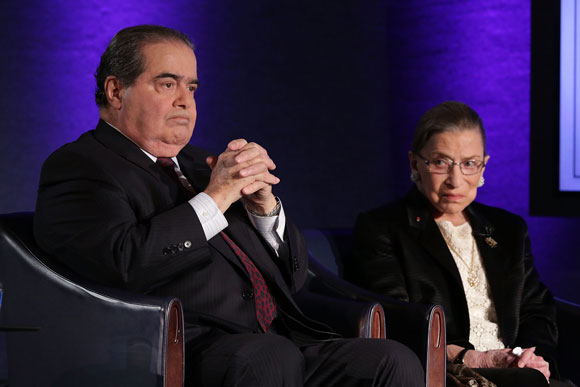Like this article? rabble is reader-supported journalism. Chip in to keep stories like these coming.
Responses to the death of Antonin Scalia, the right-wing, fundamentalist, vituperative U.S. Supreme Court Justice, have been notably sympathetic, even from the left. It turns out his best friend on the court was Ruth Bader Ginsburg, also his fiercest legal foe. They holidayed together. Stephen Colbert got teary recalling that, after he roasted conservatives, only Scalia greeted him warmly.
This isn’t mere politeness, not in the current environment. Leftist Glenn Greenwald wrote, after Margaret Thatcher’s death in 2013, that respectful silence would be “not just misguided but dangerous.” And Scalia had been belligerent. He backed unlimited political spending by the rich and untrammelled gun rights — for which you could say he had blood on his hands. He reviled affirmative action and gay marriage. He called evolution a “bad guess” at best and poured scorn on colleagues’ views. So what accounts for the affection?
Based on my own fondness for very right-wing people I’ve known, I’d say it isn’t just the discovery that they too are “human,” based on particular qualities (usually humour). It’s something else: the realization that they might easily have been on your side and, even more shocking, that you might have been on theirs. “We all could have been anything,” said the late John Seeley, social scientist and psychoanalyst, who fought tirelessly for “progressive” causes. I think knowing Scalia evoked such thoughts. Politics is a chasm and it’s worth battling over, but it’s also a result of chance and circumstance. He and Ginsburg saw, I’m hypothesizing, a different version of themselves in each other.
The left journalist of my era who I admired most, the late Alex Cockburn, used to challenge interns, saying: “Is your hate pure?” It’s almost the only thing he said that I found hard to digest. But maybe what he meant was: given the human ability to identify and find oneself in our opponents, it’s crucial not to let that hamstring action. Identify if you must, but fight the fight nonetheless.
(I’m tempted to mention iconic Quebec filmmaker Claude Jutras here, who killed himself in 1986, at 56. Allegations emerged this week that he had sex with very young boys, including one from the age of six. His name was swiftly removed from a prestigious award and public places. Columnist Lysiane Gagnon wrote that he’d been smeared with “flimsy evidence” but what if the evidence is strong — as now appears? Does that mean he doesn’t deserve compassion? Someone I know calls pedophilia an almost uniquely sad state. No one chooses to feel the feelings. You find them in you. It is unconscionable to act on them; and not to act on them, lifelong, is tragic. In certain ways, it’s like politics. You start from a situation you never chose, then try to take control.)
I watched the House of Commons debate Wednesday on policy toward the Islamic State. Interim Tory leader Rona Ambrose attacked Justin Trudeau (“Because of him!” she said, pointing) for not seeing the “evil” of ISIS, which is our polar opposite. Yet Western policies had a hand in creating ISIS; without “us,” it wouldn’t exist. Everyone seems to agree on that. The problem with demonizing the enemy isn’t so much that it dehumanizes them as that it exempts us, it blinds us to our own complicity. If they’re evil and we’re not, we can’t be implicated in the mess of the Mideast. That makes it awfully hard to ensure that the same mistakes aren’t repeated.
No discussion of this sort would be complete without mentioning Hitler. So:
Journalist-activist June Callwood (1924-2007) was one of Canada’s great fighters for social justice. Her husband, Trent Frayne, said she wrote each day till about one, then got in her little red sports car and went out to change the world — with considerable success. I once ran into her at a gallery opening. The artist proudly dragged her to his portrait of an eminent Canadian. “I was trying to capture something,” he said. “Yes,” said June empathically, “she looks very vulnerable.” “Oh June,” I said churlishly from across the room, “you’d say Hitler looked vulnerable.” “Well,” she replied, looking over at me and not missing a beat, “he had a very unhappy childhood.”
For her at least, the ability to identify with her “enemies,” and the resolve to fight her battles against them, weren’t contradictory. They fed each other.
This column was first published in the Toronto Star.
Photo: Peter Stevens/flickr
Like this article? rabble is reader-supported journalism. Chip in to keep stories like these coming.




